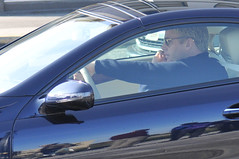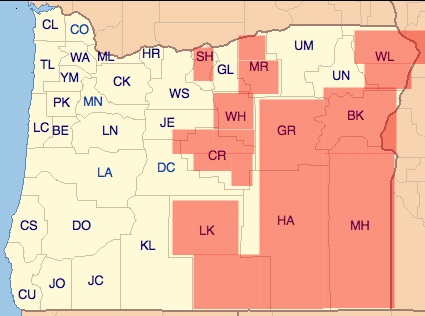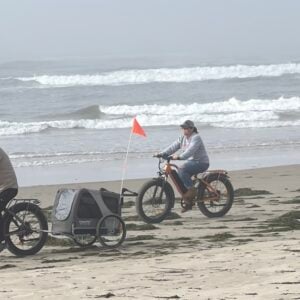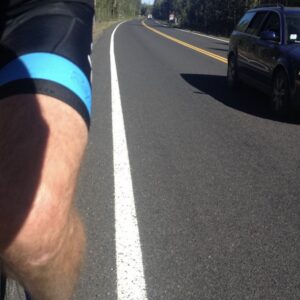
this would be perfectly legal if HB 2507 passes.
(Photo © J. Maus)
In 2009, the Oregon State Legislature passed a law (ORS 811.507) that makes it illegal to use a hand-held cell phone while driving (hands-free headsets are allowed). The law was great news for traffic safety advocates who are well aware of the clear and present dangers posed by distracted vehicle operators. This session there are four bills that seek to make amendments to that law — and surprisingly, two of them would actually make it weaker.
HB 2507 seeks to allow usage of a mobile communication device while operating a motor vehicle in “frontier counties.” The bill defines such counties as those which have a population density of fewer than six people per square mile. There are 36 counties in Oregon. A cursory analysis reveals that 11 of them — Baker, Crook, Gilliam, Grant, Harney, Lake, Malheur, Morrow, Sherman, Wallowa, and Wheeler — would become legal cell phone usage zones if this law were to pass. The map below shows the counties shaded in red…

HB 2507 is sponsored by House Representatives Bruce Hanna (R-Roseburg) Cliff Bentz (R-Ontario), Sherrie Sprenger (R-Scio), Jim Thompson (R-Dallas), and Jim Weidner (R-Yamhill).
Two things are of particular note when thinking about HB 2507. First, all the legislators sponsoring it so far voted against the cell phone bill back in 2009. The second, and more important in my opinion, is that these rural counties where lawmakers want to allow cell phone use are home to the deadliest roadways in our state.
According to the Oregon Department of Transportation (as stated in their 2011 Traffic Safety Performance Plan), the traffic fatality rate in rural areas is about 2.0 per million miles traveled. On urban roads, that rate is only about 0.6. Here’s another data point worth keeping in mind:
“Over 72 percent of all 2008 traffic deaths in Oregon (including speed-related events) occurred on the Rural State Highway System. The Oregon State Police do not have the staffing levels needed to appropriately address and make significant death and injury reductions given current and known future staffing levels.”
Another proposed law that would weaken our existing cell phone bill is HB 2822. This bill would make the law a secondary offense — meaning a police officer could only cite someone for the violation if they had already stopped them for some other reason. Currently, because it’s a primary offense, if an officer sees someone using a cell phone while driving, they can pull them over and give them a ticket. That would change if this bill passes. HB 2822 is sponsored by Rep. Kim Thatcher (R-Keizer) (who also voted against the existing law).
If, unlike the lawmakers mentioned above, you feel that our cell phone law should get tougher on violators instead of weaker, than there are two bills you can get behind.
Senate Bill 407 seeks to remove one of the (many) existing exceptions to the law. The bill, “removes exception for person operating motor vehicle in scope of person’s employment.” This bill seems smart, seeing as how “employment” in this case was never defined by lawmakers in 2009.
House Bill 2594, sponsored by Rep. Mike Schaufler (D-Happy Valley), would amend our existing cell phone law so that bus operators would face suspension of their commercial driver’s license if found to be in violation of it.
We’re tracking all these bills as well as many others… Stay tuned. Browse all of our 2011 Legislative Session coverage here.







Thanks for reading.
BikePortland has served this community with independent community journalism since 2005. We rely on subscriptions from readers like you to survive. Your financial support is vital in keeping this valuable resource alive and well.
Please subscribe today to strengthen and expand our work.
You can already use “a mobile communication device while operating a motor vehicle” anywhere in Oregon if you have a hands-free mechanism, if I’m not mistaken.
And I’m OK with “in scope of person’s employment”, if the worker is in a marked commercial vehicle. (sorry)
We really are a lake of blue in an ocean of red, aren’t we? That map is frightening.
On topic, I don’t have much of a problem with the frontier county exclusion from the rule. That being said, if we can exclude certain counties from this rule, then that should open up the chance for us to be able to exclude any Portland highways/Interstates from the tire studs law, making it illegal to run them in Multnomah County, right?
In reply to Jackattak, It makes a difference because people are either already confused by the current law or uninformed or not expecting to get caught doing it, because since I drive a school bus around Portland Metro Area over 500 miles a week I see plenty of people holding that phone to their ears talking, holding it in their laps texting apparently unaware that there is a 25% for talking and 35% for texting greater impairment while doing those activities while driving.
Nobody lives in those counties! And its not a dem/repub map, but pop density. All but like 5 counties are repub.
Republicans trying to pass this bill……shocker.
Eastern Oregon……shocker #2.
“… surprisingly, two of them would actually make it weaker.”
I don’t find this surprising in the least.
Thanks for the update.
They don’t sell blue tooth devices on the outer rim.
Or speaker phones, apparently. My first cell phone, (in 1998,) didn’t have one, but since then they’ve been pretty much a standard feature. I wish I could say the same about waterproof, (my current cell phone is good to 15 feet, although I’ve only tested it to about 6 inches,) but I digress.
“Outer rim”?
Is that like Reaver territory?
Is there no such thing as internet access where by these “more equal” cell phone users can purchase bluetooth accessories?
This is a trick question: if they have a cell signal they ABSOLUETLY have internet access, slow though it might be.
Hutt Space
Anecdotal question: has anyone actually heard a firsthand account of anyone being pulled over for violating the cell phone law?
Not a one. Walking as much as I do around Downtown I see a gazillion infractions an hour, too.
A law is only as good as its enforcement.
I saw someone pulled over on MLK the other day for exactly that reason.
Okay, that’s good feedback. I’m with Jackattack: I see a gazillion of them a day and had never heard of anyone being pulled over for it.
me. got the ticket, learned the lesson…
OR or WA?
OR, Portland…
My wife was pulled over for that exact reason about a month ago. Got off with just a warning.
There aren’t many things to hit out in those counties, but people seem to manage it just fine. Maybe on limited access, divided, rural interstates I’d understand it, but it can not be a good idea on twisty 2 lane roads. Even with the low populations, the roads are not the type that go straight for 30 minutes with good visibility. There is often little visibility and there are some fairly large towns in the area (Baker City, Ontario, John Day all have shopping districts, etc.)
I’m OK with the frontier exclusion, nixing bus drivers from gabbing as well as commercial drivers in general. Not OK with the revision to make it a secondary offence.
So, those are more deadly roads, but what are the stats for collision rate? I’d say accident rate as a general term but I know that wouldn’t go over too well here, so I mean any traffic event resulting in damage let’s say. What I’m gettinga at is since it’s so rural, response time is going to be much slower as well as transportation of the injured and the higher death rate may be a product of that. What about how many of those ‘incedents’ involve other drivers? …were talking on cell phones? Just saying they’re deadlier doesn’t say very much. After all, there are also more alien abductions out there as well!
In reply to Toby, I drive a school bus and we are already forbidden from using our cell phone by company policy. We actually are forbidden by that policy to turn it on while at work, which means in the bus. Besides that, it is plain unsafe to conduct a conversation into a cell phone whether hands free or not, because you are not really present in your physical location. 25% impairment while talking and 35% impairment while texting.
The real question is, what’s the cause of death on these roads? If the primary cause of death is drunk driving, HB 2507 likely won’t have much effect. If the primary cause is distraction, then the bill is harmful – but if it’s due to people falling asleep at the wheel, then HB 2507 might actually help. It’s hard to say without additional data. Given the small number of cyclists in those areas, I’d imagine that most of those deaths are due to the following:
– motorists losing control of their vehicle and driving into a ditch/obstacle
– collisions with wildlife / livestock
– alcohol / falling asleep at the wheel
– driving too fast for conditions (especially overdriving headlights at night)
Does anyone have any data to support or refute those conclusions?
Matt,
I could dig into the causes of the rural crashes, but from what I remember, speed, head-on collisions, and flying off the roadway are likely the culprits.
Is it safer to use a cell phone in the city where speeds are 15mph and there are more traffic interactions… or is it safer to use a cell phone going 65-70mph in a rural setting where there are fewer traffic interactions?
And fewer turns.
Depends on the road. Some of the rural Oregon roads are very twisty with multiple blind corners.
It’s safer to use a cellphone at 70mph if on a straight road with unrestricted vision. The real danger of the bill is that it’s still legislating “one size fits most” and not addressing the core issue. The core issue is cognitive load on the driver. Strictly speaking, it’s unsafe to have a conversation with another human inside the car when driving downtown – though the unsafe portion is usually offset by the additional pair of eyes to pick up and communicate dangers.
All transportation above 25 mph is inherently dangerous, and cars are inherently dangerous due to restricted visibility and restricted audibility. As a culture we continue to ignore those dangers, especially since there’s only a 1 in 6,800 chance that it will kill us – most people are willing to accept that risk.
I’m not surprised that speed is a major factor in deaths – twice the speed is 4x the impact energy – it gets lethal quick. This is also why head-ons are so deadly – they typically have twice the relative speed (and hence 4x the energy), which also means half the reaction time.
Enforcement? The bill in its present incarnation is already NOT being enforced consistently, either because law enforcement resources are stretched thin or because individual officers are tied up with dealing with more serious crimes.
These two new proposals are simply a way of legitimizing the lack of teeth already in place.
The only law I see broken more often than this one is ORS 811.335, and enforcement of it is non-existent.
I still don’t understand the purpose of the bill. The only study that proved holding a cell phone to be more dangerous than a hands-free device was the study sponsored by the headset maker Plantronics. The problem is distraction. Either ban or allow their use outright. Currently the law is half-assing it, unjustifiably nagging the public into buying headsets while not solving the problem.
I suspect someone will offer up an 35 m.p.h. exemption of the cell phone ban as well.
If you live out on a rural farm where the nearest plaid pantry is many miles away then I think they should be legally able to talk on their cell while they drive. It is a lot different driving in rural areas than in the city. So many times there is nobody in front of you and nobody in back of you for a long time, you are not so dangerous as when you are in traffic on I-5 in Portland
Who’s the enemy of the public here?
The latest full statistics are for 2008.
In that year there were 37,261 traffic related deaths.
14,587 were passenger car involved.
10,764 were light truck involved deaths.
677 were large truck involved deaths.
67 were bus involved death.
The rest are unclassified.
You wanna a law?
Then make it the enemy, AUTOMOBILES!
I recently moved to CO, and have been shocked by 1. The sheer amount of cars in the city, and 2. The number of people (probably close to 40% based on my observations) who drive while holding cellphones up to their ears.
I took a job as a delivery driver, and use a bluetooth headset whenever I need to take a call. If I need to *make* a call, I wait until I’m stopped at one of the delivery points. I’d be perfectly happy to see that loophole taken out. (and similar laws applied to Colorado).
I’m a lifelong Portlander who recently spent four months in Grant County. It seemed like the car crashes during that time were mostly due to speeding or collisions with livestock/wildlife. While the shoulders are silky smooth for riding, there is no speed enforcement and minimal visibility around the hills, canyons, and other vehicles. Yes, the drives can be hours-long and monotonous. But distracting yourself with a phone call drastically shortens an already hindered reaction time. I am absolutely against HB 2507.
Perhaps they should also ban radios, eating, drinking, smoking, talking to anybody in the car…. These can all be distracting
This is why the other 28 counties of the state feel like the valley is a dictatorship. As long as PDX opposes this, it will never past.
GOOD. I hope they don’t weaken the existing laws. I’d much rather see beefed up enforcement, which is currently laughable.
Anyone asked or offered the reason the sponsors want to weaken the law?
Perhaps if you’re unable to do the things Jim listed above, you shouldn’t do them. The research on the matter demonstrates that we aren’t able to give full time and attention to driving while using cell phones, which are more distracting, more often, and for longer at a stretch than the other activities listed. Yeah we all think we are, but we’re not.
Keep it simple and enforce it. Hands-free telephone use while driving–everywhere. Bluetooth or wired voice activated headsets and compatible phones are not cost prohibitive these days.